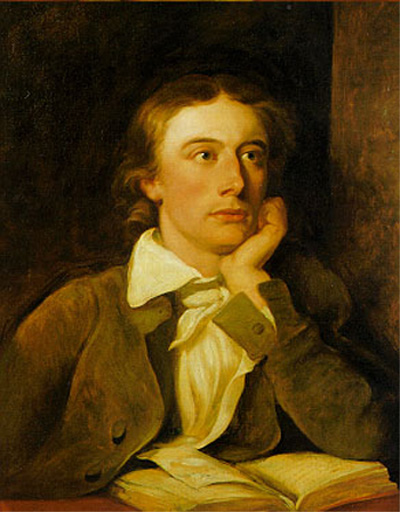|
TO AUTUMN Who hath not seen thee oft amid thy store? Where are the songs of Spring? Ay, where are they? http://www.bartleby.com/106/255.html,
visited May 13, 2006 |
|
Having
read only the title we can expect that the poem will be going to refer to the
season of Autumn. We can not know whether he will talk
to Autumn with negative aspects or positive ones, we
do not know if it is going to be a friend or an enemy, but the fact is that
John Keats talks to Autumn as if this season were a person. This
personification of Autumn is an allegory, John Keats
is the sender and Autumn is the direct receiver of this poem.
The
first reading of the poem gives me the information of that Autumn
is certainly his friend, John Keats is writing about the good aspects of this
season in the whole poem. And as a Romantic poet, the best of Autumn can be appreciated in nature.
The
topic of the poem is the time reflected in nature, we can see poetry in the
flowers of Spring, the golden light of Summer, but, why Autumn could not be
poetry by itself too? Autumn does not mean the beginning of the death of what Spring and Summer have been giving life, there is still life
in Autumn, but sometimes we do not appreciate it.
I
think the author wants to highlight those things we can not see, those little
things in nature we usually think are not important, but they are important for
him, those things are part of nature and that is why they are important.
The
first verse: “season of mists and mellow fruitfulness”, means that when
Autumn comes to us, we do not see the great light during all the day as we can
see in Summer, there is fog, mist in the mornings but it does not stop the
process of maturing things. But that process is not possible without the help
of the sun. That sun is conspiring with Autumn, it
gives Autumn the sufficient heat needed in this moment, as if they were lovers,
they “load and bless” (verse 3) and do together all the actions
explained in this paragraph. They are part of natural circle of life and they
occur in Autumn, only in Autumn.
The
author tries to convince us about the importance of Autumn,
all things related with nature are important, we can not forget the smallest
detail of nature.
Verses
8, 9, 10 and 11 are about the role of bees in Autumn, Autumn can keep some of
the heat of Summer and they feel warm more time: “for Summer has o’er-brimmed
their clammy cells” (verse 11). Autumn is not as cold as Winter,
we can still feel the heat in this season, we can still feel the life in this
season.
The
second paragraph starts with a rhetorical question: “Who hath not seen thee
oft amid thy store?” (verse 12), is like saying:
Who can not see yourself in your proud? who can not
see your spectacular looking?, who does not appreciate you?. He is encouraging Autumn because “she” can feel disdained if we compare her
with the joy of Spring and Summer.
In
this second paragraph I confirm that Autumn is seen as
a female character because in verses 14 and 15 there are two words: “careless”,
and “hair soft-lifted”, usually used referring to the female genre. She
is preparing herself to fall asleep in Winter, she is
making good use of the last drops of Summer to give way to Winter: “… with a
patient look, thou watches the last oozings hours by
hours” (verses 21 and 22).
In
the third paragraph again the importance of Autumn on
us is highlighted. In Spring, everybody is happy, but
Autumn has not why to be sad, and has not anything to envy Spring, “think
not of them (songs of Spring), thou hast thy music too” (verse 24).
But,
“where are the songs of Spring?” (verse 23), they had completely disappeared in Autumn, but as
the author says, Autumn has its songs too. From now to the end of the poem,
John Keats is answering the question: how are the songs of Autumn?
Autumn
has a colour “rosy hue” (verse 26), when the day is disappearing, in Autumn dusk, the “death” of the day is like the bloom of the
sky because it is rosy, it has a beautiful colour and a beautiful sound as we
will see.
“The
small gnats” (verse 27) are disappearing because they live
only in Spring and Summer. They mourn as a “wailful choir” (verse 27) because they can
not be present in Autumn, they are sad because they can not see any Autumn; “the
light wind” (verse 30) is a typical sound in Autumn, and in the rest of
verses are written the other great sounds that compose “the songs of Autumn”.
All
these sounds are not as happy as can be the Spring
ones, but when we read the whole poem and this particular part, we receive
Autumn as a season of peace and serenity, a season where nature, and probably
human minds, starts maturing.
Before
I read it, I thought that John Keats will be going to talk about the sadness of
Autumn, because Autumn is the season where nature
begins to die. But instead of this, he is trying to convince us that Autumn has many wonderful things as Spring, Summer, and even
Winter.
And
the best way to behold Autumn in all its proud is in
nature. He is talking about nature in the entire poem, nature is important
because it “touches” us, involves us, and has a lot of influence in our lives
and especially in our feelings.
